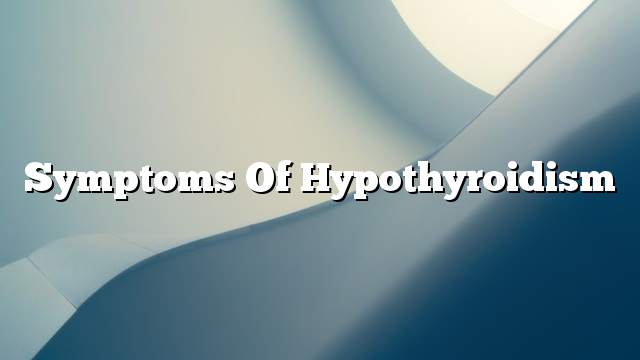Symptoms of hypothyroidism
Symptoms of hypothyroidism differ from one patient to another. It is very common that there is no satisfactory symptom at all and that the patient is only suffering from obesity or an increase in cholesterol, but when symptoms appear, they are often unclear and progress slowly. Weakness in appetite but there is an increase in weight
Hypothyroidism suffers from chronic constipation and a sense of fullness. It also suffers from slow thinking, inability to conclude, low memory, depression, extreme sadness without cause, and crying without cause. Symptoms include weakness of muscles, inability to lift arms to easily lay off hair, muscle cramps And imbalance, and suffering from the patient as well as chest pain and rapid breathing and chronic anemia
The patient suffers from cold intolerance, muscle pain, joint pain, and flatulence. Women also suffer from the abundance of menstrual cycle, low birth weight and ready for abortion. The patient also suffers from frequent chest infections and colds easily due to lack of immunity. Also, when the patient is examined, there is a loss of hair in the front of the head and the outer part of the eyebrows, as well as general paleness and sometimes swelling in the neck and that the skin is cold and thick and dry, and also note the presence of slow pulse and bomb in the hair.
Summary of symptoms of hypothyroidism
1-Tired
2 – general weakness in the body
3. Weight gain or increased weight loss difficulty
4. Coarse hair, dry hair
5 – Dryness and pale skin
6. Hair loss
7 – feeling cold
8 – muscle cramps and recurrent muscle pain
9. Constipation
10-blues
11. Irritability
Memory loss
13 menstrual cycles abnormal
Decreased sexual desire
Topics on thyroid disease
Conclusion
The thyroid gland is one of the endocrine glands located at the bottom of the neck. Two hormones, thyroxine T4 and triiodothyron 3, are secreted. The function of their hormones is to regulate and accelerate vital activities throughout the body. Its disease results from increased secretion of these hormones, Or lack of secretion of these hormones called thyroid insufficiency
Symptoms of hyperthyroidism are many of the most important increase appetite and weight loss and diarrhea and increased heartbeat and menstrual cycle disorders in women. The symptoms of hypothyroidism are loss of appetite, weight gain, constipation, lethargy, etc. The diagnosis is based on the work of thyroid screening, T4 and T3 and thyroid stimulating hormone
Treatment of hypothyroidism is based on giving the patient fibotheroxine. Treatment of hyperthyroidism is a surgical, radiological and pharmacological treatment.
